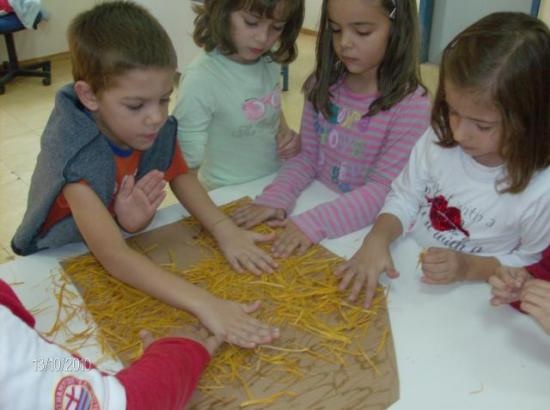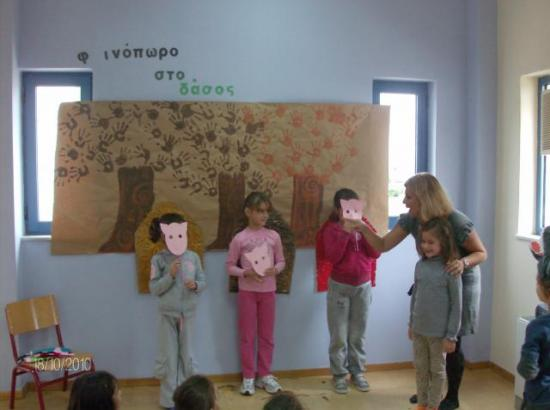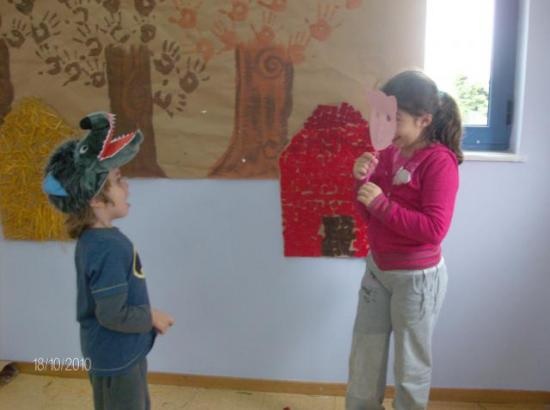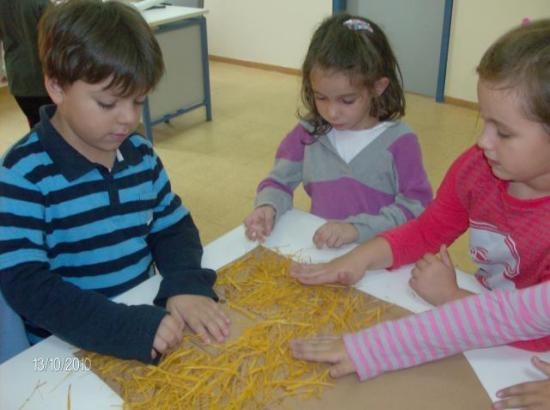The programme
THE ENGLISH FOR YOUNG LEARNERS PROGRAMME IN GREEK PRIMARY SCHOOL
Within the context of the Project entitled “New Foreign Language Education Policy in Schools: English for Young Learners” (EYL), English has been introduced as a compulsory subject in primary school from the first grade in 20% of the primary state schools of the country.[i] In other words, the first foreign language has been introduced at age 6-7 and the programme has been piloted. In the rest of the state schools, foreign language learning starts in the third grade, i.e. at age 8-9. This innovation is one of the components of an enriched school curriculum introduced by the Greek Ministry of Education in 2010-11, on an experimental basis, in 800 of the largest state schools in the country. Thanks to this project therefore, which was expanded in 2011-12 to include 161 more schools operating as enriched-curriculum “all-day” schools,[ii] 40% of the first and second grade pupils in Greece are now starting foreign language learning from an early age.

The plan to implement the ‘all-day school idea with its enriched curriculum in all primary schools of the country has not yet been realized, due to the economic crisis that has hit Greece quite severely since 2010-11. However, the English for Young Learners programme that concerns English language learning in the first and second grade of Greek state primary schools has become very popular and there is social demand for its expansion.

The decision to offer the first foreign language from an earlier age in school was not a random decision. The Greek Ministry of Education consulted with academics, experts in the areas of foreign language education and early language learning. The Ministry’s question was not so much about which foreign language to introduce first, since in Greece as in many other European countries, English is viewed as the de facto international language and it is the first language in the vast majority of European schools. Rather, the issue at hand was whether foreign language learning should start at such an early age. The experts’ standpoint in favour of early language learning (ELL) was supported by research findings and by recent recommendations by the European Commission that regards ELL as a factor contributing to multilingualism.
The apprehension about ELL was also shared by Greek classroom teachers and other stakeholders, such as PEAP school headmasters, pupil’s parents, etc. The most common concern was the stereotypical view that children starting to learn their mother tongue in school would get confused if they were to be introduced to a foreign language at the same time. However, the initial anxiety was progressively eradicated, as project research results have shown. In its two and a half years of successful implementation, the PEAP programme –which has been expanded to include a revised curriculum and teaching-learning materials of the third grade of primary school– has become widely accepted. This change in attitude is partly due to the specialist EFL teachers who have been involved in the implementation of the programme, as most of them were enthusiastic about the introduction of English very early from the start, even though they were not really trained to teach children at such a young age. It is also due to the various ‘awareness raising’ events that the PEAP project team organized for teachers and
other stakeholders, explaining the benefits of ELL and referring to good practices in other EU countries – some of which are offering foreign language instruction at kindergarten. However, the decisive factor was the pupils themselves and the fact that the majority of children came home from school happy about their English classes. That was what convinced the parents who in this way realized that their children were happily learning something after all.

The purpose of the programme is to develop young pupils’ social literacies through English and this is the foundation upon which the PEAP curriculum, its syllabuses and instructional materials are based. They aim at the development of children’s creativity, the development of respect for the self and the ‘Other’ and of a positive attitude towards languages and language learning, as well as at the acquisition of an initial awareness of linguistic and cultural difference.
The curriculum is based on three fundamental principles:
1. It views pupils as learners with an emerging school literacy in their mother tongue and aims to help them develop in and through English those social literacies that they have already developed in their mother tongue.
2. It makes provisions for differentiated instruction, i.e., its curricular materials have been designed by taking into account the fact that individual pupils have different interests, preferences and learning styles, and that the pupil population of different schools has different types of social experiences and needs.
3. From a language learning point of view, the PEAP curriculum is aimed at developing a pre-A1 level ability to understand and use spoken language.
In line with the aforementioned principles, the curriculum views the balanced treatment of both communicative and pedagogic practices important. Respect towards diversity, enhancement of self-esteem and the development of an intercultural ethos of communication are considered equally important as the development of everyday communicative practices. The development of social skills is considered just as necessary as the development of learning strategies and oracy skills.
The curricular materials draw on the principles of interactive learning and those of the holistic approach. The language activities have been based on a range of methods and techniques intended to motivate young learners and to engage them in the learning process. In designing the language activities, the special characteristics of children at this age have been taken into account, and special consideration of their cognitive development has been made. When these activities were used in class, they were evaluated for their practicality and applicability by both experienced and inexperienced EYL teachers, as well as by the materials designers and project researchers.
The curricular material for the two year PEAP programme revolves around thematic areas which interest young learners, such as animals and toys, family and special customs. In following a cross-curricular approach to language learning, the topics and issues on which the activities are based are in legion with the issues dealt with in the other subjects of the pupils’ school curriculum.
 Each activity is like a game, but it has unambiguous pedagogical objectives, which are clearly articulated for the teacher. It also has lucid language learning objectives and employs techniques for the presentation, practice, and the use (plus recycled use) of new utterances and stretches of talk in a variety of situational contexts, though role-play, mime and other types of action-oriented tasks. Songs and rhymes are often included and extensive use of extensive visuals, stories and fairy tales is made.
Each activity is like a game, but it has unambiguous pedagogical objectives, which are clearly articulated for the teacher. It also has lucid language learning objectives and employs techniques for the presentation, practice, and the use (plus recycled use) of new utterances and stretches of talk in a variety of situational contexts, though role-play, mime and other types of action-oriented tasks. Songs and rhymes are often included and extensive use of extensive visuals, stories and fairy tales is made.
The instructional materials described above are not included in course books which resemble the commercial EFL course books for juniors. Actually, they are different I many ways basically because the overall aim of the PEAP curriculum is not merely to teach a specific number of words and phrases in English, while also teaching a few songs and rhymes on the side. The curricular materials are included in dossiers with visuals, CDs and detailed guidelines to teachers – in their mother tongue, not in English. The main bulk of the instructional materials is complemented with extra activities that can be used by the EFL teacher to suit the differentiated interests and needs of his/her pupils. This way each teacher can choose among a wide variety of activities those which best suit her and her class, so that a learning environment appropriate for the specific class and teacher is created.
The PEAP portal, to be found at http://rcel.enl.uoa.gr/peap contains the curricular materials described above in a repository through which teachers can easily access regular and extra instructional materials. The importance of this repository is couple with another important area of the PEAP portal: that is is the “PEAP Teacher Development” section which contains a lot of information, slides, videotaped material but also an on line course that can be accessed by all Greek in-service EFL state school teachers.
The portal also contains the curriculum and syllabuses for the first two grades of primary school, as well as the syllabus and the teaching-learning material for the third grade, which has been developed within the context of the PEAP project. Although the PEAP programme focuses on the first and second grade, the PEAP project team decided to proceed to the development of third-grade material in order to ensure that there will be some kind of continuity between teaching and learning of English in the first two grades and the third grade.
Soon to appear also in English, the PEAP portal also contains The Teacher’s Corner, and also the Parents’ Corner. In the Teacher’s Corner PEAP teachers can communicate their experiences to each other and to the project team and they can also include their own ideas for materials and upload information about events they have organized during the implementation of the programme. The Parents’ Corner, on the other hand, provides information regarding ELL and provides them with access to materials that they can use at home with their children at home so that their kids use English while having fun with their parents.
Within the framework of the PEAP project, extensive research has been carried out by members of the PEAP project team. The results of this research have already been published in Greek and they are currently available on line in the PEAP portal. Papers that focus on the results and main findings of this research are also expected to appear in English in a special issue of ((Directions?), that is the e-journal published by RCeL).
All findings point to the successful implementation of the PEAP programme but the most convincing evidence of the programme’s success is the stakeholders’ own comments. Letters of gratitude from teachers and parents are not at all infrequent and they tell us that “la lot of children consider English their best subject at school” and they are impressed by “the amount of English kids learn in school”.
In conclusion, an important outcome of the Project itself, and perhaps the most prominent one, is the change in the teachers’ attitudes and their transformation from mere ‘instructors’ and ‘transmitters of knowledge’ to designers of their own teaching practices.
B. Dendrinos, K. Zouganeli and C. Kossovitsa
(text also appears in Polydromo)
[i] Τhis Project, carried out within the framework of the Lifelong Learning Programme, through the Cohesion Policy 2007-13 National Strategic Reference Frameworks (NSRF), is financed by Greece and the European Union. The General Director of this Project, carried out by the University of Athens, at the Research Centre for Language Teaching Testing and Assessment (RCeL) of the Faculty of English, is Professor Bessie Dendrinos, who collaborated for the purposes of the project with experts in the field of Early Language Learning from the University of Athens and Thessaloniki, as well as with researchers from Greece and other countries. For more information about the Project see: http://rcel.enl.uoa.gr/rcel/eyl_at_school.htm.
[ii] The “all-day” primary school programme is also co-funded by the Greek state and the European Union, as part of the Lifelong Learning Programme though the NSRF.
For the PEAP programme booklet, press here.




